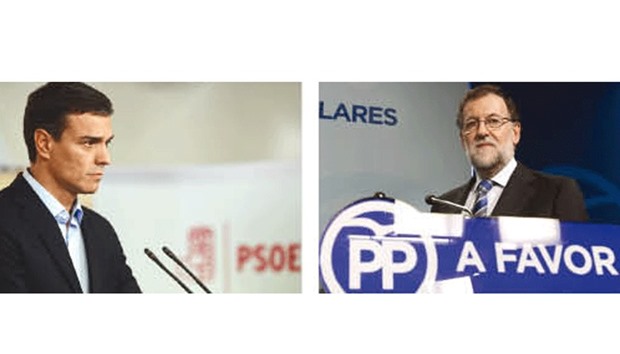Regional elections in Spain on Sunday have strengthened acting Prime Minister’s Mariano Rajoy’s conservatives and weakened the Socialists, who are now under pressure to let him form a government and end a months-long political impasse.
The country is being run by a government without full powers following inconclusive elections in December and June that saw Rajoy’s Popular Party (PP) win without an absolute majority and other parties fail to forge a rival coalition.
The polls in the northern regions of Galicia and the Basque Country have thus been seen as a possible game-changer, reflecting the public mood as an October 31 deadline looms.
If no government emerges by then Spain, the eurozone’s fourth largest economy, will face an unprecedented third election around Christmas.
The PP renewed its absolute majority in Rajoy’s northwestern home region of Galicia, a long-time party stronghold.
And the Popular Party lost just one seat in the independence-minded Basque Country where its strong defence of a united Spain has never been popular.
Rajoy’s conservative PP won 41 out of 75 seats in the regional parliament in Galicia – equal to its share in the outgoing assembly – with over 95% of ballots counted.
In the verdant Basque country in northern Spain, the PP came in fifth with nine seats in the 75-seat assembly, down from 10 seats in the outgoing assembly, after 99% of the ballots had been counted.
The moderate nationalist PNV party was once again the most-supported party in the Basque region as expected, winning 28 seats, but without an absolute majority.
In both regions, the Socialist party (PSOE) lost seats from previous elections four years ago and lost votes to new anti-austerity party Podemos, which is seeking to replace it as Spain’s main party on the left.
The PSOE finished fourth in the Basque region, behind Podemos, and was tied in Galicia with the En Marea coalition which includes Podemos with 14 seats each.
“These results are not good for the Socialist party,” said Cesar Luena, one of the most senior officials in the formation. “It is a negative result in both regions.”
The Socialists’ poor showing follows bad results in December’s general election and again in the June repeat vote.
It is expected to increase pressure on Socialist leader Pedro Sanchez to allow Rajoy to form a new government at national level.
Sanchez had voted against a Rajoy-led government in a parliamentary vote of confidence earlier this month.
He is seeking to negotiate a leftwing coalition alternative with arch-rival Podemos.
But a weak result could wreck this strategy, either forcing Sanchez out or pressuring him into allowing the rightwing coalition government through by abstaining in another vote of confidence.
“The Socialists have sunk here and in Galicia, and it should take note of the message of the ballot box,” said former health minister Alfonso Alonso, who headed the PP’s list in the Basque region.
The Socialist will hold a leadership meeting on Saturday to decide their next steps in the national impasse in the light of their regional showing.
Sanchez is unpopular among many so-called barons, or regional party leaders, who think the party should help end to Spain’s nine-month deadlock by admitting defeat and allowing Rajoy to come to power.
Poor results at regional level could re-open an internal leadership war.
Spain has never had a coalition government since its return to democracy after the death of dictator Francisco Franco in 1975.
This lack of experience has been blamed in part for the failure of talks to create a governing alliance.
Voters, though, are starting to get frustrated with the political vacuum.
“We are making fools of ourselves,” said 61-year-old civil servant Mercedes Solana, as she cast her ballot in the fashionable Basque resort of San Sebastian.
Spain’s Socialist leader stands by refusal to allow conservative govt
Spain’s Socialist leader stood by yesterday his refusal to let conservative acting Prime Minister Mariano Rajoy form a new government despite heavy losses for the centre-left party in regional elections.
“The ‘no’ to Mr Rajoy ... has never been more justified,” Pedro Sanchez told reporters after the Socialist party (PSOE) lost ground in polls in Galicia and the Basque country on Sunday.
Sanchez’s refusal to endorse his longtime rival heightens the chances of an unprecedented third general election in a year, analysts said.
Sanchez repeated his desire to form a “government of change” that ousts the PP from power and said he wants the PSOE to hold primaries on October 23 in which he will stand again as leader.
“There is enough time for the debate to be held ... and for us to form an alternative government,” he said.
In Sunday’s elections, the PSOE lost ground to new anti-austerity party Podemos, which is seeking to replace it as Spain’s main party on the left.

Sanchez: The ‘no’ to Mr Rajoy ... has never been more justified. Right: Rajoy at a press conference following the Popular Party’s national executive committee in Madrid yesterday, a day after regional elections in the Basque Country and Galicia.
